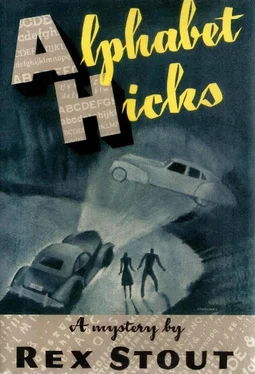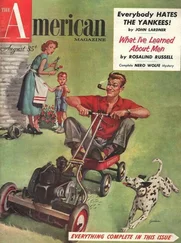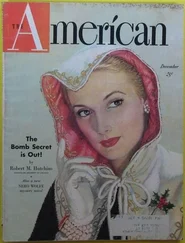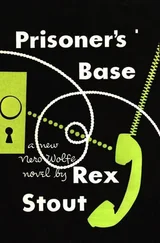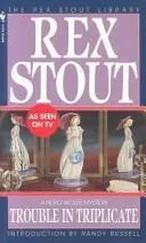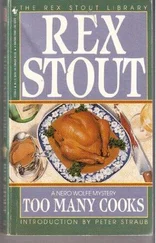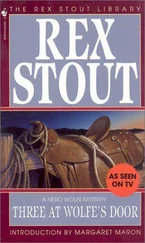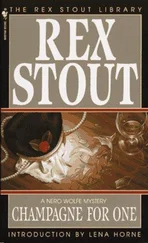“I didn’t say they’re precious. I don’t say they’re any treasure. But you must have done something with them. Darn it, you couldn’t eat them! I’m asking you — please! Don’t you realize how embarrassing and humiliating this is for me? I can’t very well tell you—”
“Someone’s coming. Your father and Mr. Brager.”
They could not be seen on account of the intervening shrubbery, but the sound of their voices was quite close. Heather arose abruptly, said good night, and disappeared into the house. Ross, to escape an exchange of words with his father, tiptoed quickly to the far end of the terrace and was in an angle of the shrubbery by the time the footsteps of the two men reached the flagstones. He heard the door open and close behind them. In a quarter of an hour he went inside, listened a minute at the foot of the stairs and heard no sound from above, and ascended to his room. When he wound his watch before getting into bed it said five minutes after one.
The indefatigable orchestra was still at it an hour and forty minutes later when a car with its lights dimmed went creeping along the road in front of the house, passing the entrance without turning in. A quarter of a mile farther on it stopped, backed into a lane to turn around, and retraced its route, passing the entrance again. A hundred yards beyond, it swerved onto the roadside and stopped.
The driver turned off the lights and the engine, climbed out, and walked back to the entrance. There was no glimmer of light from the house, vaguely discernible through the trees.
“Nuts,” Hicks muttered. “A peaceful rustic scene.”
He started up the curving driveway, half expecting momentarily to be challenged by a police guard, but he reached the house and circled it to the hedge of shrubbery bordering the side terrace without being halted. There he stood on the grass and frowned at himself. What was he going to do now? Go back to the car and drive home and go to bed? Get a flashlight and search the place for a corpse? Rouse everyone and tell them he had come to see if they were all alive?
“This is me,” he muttered at the darkness. “Life size. Why in the name of God—”
He wheeled sharply and stopped breathing. A door had creaked and he recognized the creak, having caused it himself some eight hours earlier when he had entered the kitchen and scared Mrs. Powell out of her wits. The creak came again. Silently and swiftly on the grass, avoiding the flagged walk, he stepped to the rear corner of the house and, shielded by the foliage of a vine, was peering through the interstices of the leaves when he hastily drew back flat against the wall and stood rigid.
The figure passed so close to him that there was no doubt of its identity; it was Heather Gladd, in a long dark coat. She walked rapidly, but not at all furtively, with no backward glances, straight across the lawn to the entrance of the path in the woods.
Hicks waited until the woods had swallowed her and then followed. If from cover she turned for a look to the rear he would of course have been seen on the open lawn in the starlight, but there was no sign that she had; and once in the woods himself, he saw the beam of a flashlight forward on the path. It bobbed along thirty yards ahead of him, and he let it increase its distance, sure now that she was bound for the laboratory, and concentrating on the effort not to betray his presence by a misstep in the pitch darkness of the woods.
Suddenly he halted, for the light had stopped bobbing and had changed its direction. He stepped from the path for the protection of a tree trunk, thinking she had heard him and was turning for an inspection of the rear, but the beam swept only to a right angle and began bobbing again. Apparently she had left the path, about where the bridge was. Hicks went forward with more speed and less caution, for he could hear the brook plainly and knew it must be a tumult in her ears. Almost with too little caution; he reached the bridge sooner than he expected, caught a toe on it, and nearly fell.
He left the path for the protection of a tree trunk and watched a strange performance not twenty paces away. There at the edge of the brook she had placed the flashlight on a rock and removed her coat. The beam of the light was aimed down at the rushing water, not at her, but he could see that she was removing her shoes or slippers and rolling up the legs of her pajamas, and he wondered idiotically if the upshot was going to be that he had driven fifty miles in the dead of night to sneak up on a pretty long-legged girl and watch her go wading.
Then he saw that she had brought something with her. He could not tell what it was; he could see only that it was something fairly large which she picked up from the flat rock where she had also placed the flashlight. With it in one hand, and the light in the other, she stepped gingerly into the brook, waded in a few feet, and stooped over until she was bent double. Her back was to him and he couldn’t see what she was doing with her hands. At length she straightened up and waded back to the bank, and one of her hands was empty. She put the light down on the rock and started unrolling her pajama legs.
Hicks knew his location wouldn’t do. The tree wasn’t big enough, and on her return to the path the beam of light would be directly at him. The best course was to cross the bridge. He moved cautiously, and was about to step on the bridge when suddenly he whirled around.
It could not have been a sound that alarmed him, above the commotion the brook was making, but something did, for he whirled completely around before the blow fell. He saw something moving, right there at him, and then he went down.
A blow on the side of the head with a thick club could, certainly, kill a man; at the least it might be expected to crack his skull. But to an owl on a limb the nocturnal tableau there in the somber woods, in the instant following Hicks’s cropper, would have seemed much closer to the burlesque than to tragedy. There was no outcry, even from the girl in thin summer pajamas who stood on a rock manipulating a flashlight. Its quivering beam spotted first a man who from his position might have been saying his prayers, and then another man with his features contorted in an expression of desperate resolve, gripping in his uplifted hand the shattered remnant of a rotted piece of sapling. And as though not to spoil it for the owl by giving it a gravity it did not deserve, the girl called sharply:
“George! Behave yourself!”
Hicks, on his feet again, was momentarily stunned not by the puny blow which had caught him off balance but by surprise. If, as he went down, he had found leisure to guess at the identity of his assailant, certainly the last on the list would have been George Cooper.
Cooper’s uplifted hand slowly came down and the remnant of his club dropped from his fingers. The light swung away from him back to Hicks.
“Have you gone crazy too?” Heather demanded shrilly.
“I’m not crazy,” Cooper said in the tone of a scolded boy denying that his hands were dirty. The tone suddenly changed: “You! You keep away from her!”
Hicks, stepping over stony uneven ground in the dark, paid no attention to him. Heather, in her pajamas, was a pillar of white. Reaching it, Hicks demanded gruffly:
“Let me have that light.”
“I’ll keep the light,” she said determinedly. “I’d like to know—”
“So would I,” Hicks declared. “What’s more, I’m going to.” He snatched the light from her fingers and walked into the brook.
That is, he got one foot in, before she grabbed him. It was not precisely an attack; she didn’t hit or kick or scratch; but she got his coat with both hands and pulled so violently that, with his insecure footing, they nearly went over in a heap.
Читать дальше
